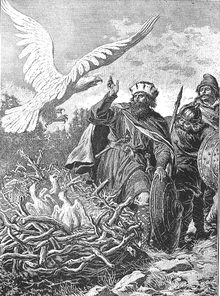Lech (Duke)
Lech was the legendary forefather of Poland . Its story was told in the Wielkopolska Chronicle in the late 13th century . He was not mentioned in the Gesta principum Polonorum from the 12th century or other medieval sources on Polish history.
According to the legend of Lech, Čech and Rus , he came north from Pannonia with his brothers Čech and Rus . He rested in the shade of a tree. He observed a beautiful white eagle that had landed on the top of the tree above him. Lech decided to settle in this place and founded the city of Gniezno ( Gniezno ), derived from the word gniazdo ( Nest ). Čech settled further south and is considered to be the forefather of the Czechs . Rus moved to the east, from which Rus arose .
The story of Lech is legendary and has no historical background. It possibly refers to a Slavic leader Lech in the 9th century, and the name is based on the word form as an augmentative to lęděnin (in German: "plowing the young soil") directly or indirectly with the name of the tribe of Lendizen (Ljachen) in context. The supposed etymological derivation of a folk or place name from a personal name in the context of a legend of origin is common practice from antiquity to the early modern period.
The original story was written at a time when King Wenceslaus II was striving to unite Poland and Bohemia under one crown.
In the 19th century, the Czech author Alois Jirásek wrote an expanded version. According to this, Lech and Čech came from the area north of the Tatra Mountains, where the Choir Fathers settled, but also many other tribes that were related to one another in customs and way of life, but all had their own dialect and fought each other because of their common land. Together they had moved west to Bohemia. In the east of Čech's new domain, Lech first founded the town of Kouřim and spent about 30 years there. After Čech's death, the elders offered rule over the Czechs to his brother Lech, who instead recommended Elder Krok and finally left Kouřim for Poland.
Individual evidence
- ^ Kronika Wielkopolska, Prologue, Monumenta Poloniae Historica, Nova Series VIII, Warsaw 1970
- ↑ For example, in the 12th century Cosmas of Prague first mentioned the legend of Boemus, who was looking for land and called it Boemia, in: Bertold Bretholz and Wilhelm Weinberger (eds.): Scriptores rerum Germanicarum, Nova series 2: Die Chronik der Böhmen des Cosmas of Prague (Cosmae Pragensis Chronica Boemorum). Berlin 1923 ( Monumenta Germaniae Historica , digitized version ), I. 2
- ^ Alois Jirasek: Bohemia's old legends , page 17–31. Artia Publishing House, Prague 1975

